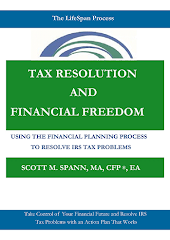Plenty of people make resolutions to lose weight, get a new job or make other things happen in their personal life, but relatively few make solid resolutions about money. Make 2010 the year you’ll live a better life financially. Here are a few resolutions to think about:
Write down the things you really want in life: Have you ever written down the big things you want in life? Granted, all great dreams don’t cost money, but many of them do. Money buys freedom – to travel, to retire early, to start a business, to change careers. Putting goals in writing gives them a formality and a starting point for the planning you must do.
Evaluate your risk tolerance: One of the most beneficial things financial planners do is help you articulate your financial goals and establish (or re-establish) your tolerance for risk. With the recent recession and market turbulence, many individuals would benefit from an analysis of how much risk they want (or need) to take based on what they want to achieve with their money.
Track your spending: If you haven’t purchased financial accounting software or set up a reliable accounting method of your own, this is the year to do it. Diligent expense tracking is the first critical step to getting personal finances in order whether you do it on paper or on your computer. Mint.com or QuickenOnline.com are free online programs that help you do this.
Get tax and planning advice toward retirement, other goals: Maybe you’ve always winged it with your taxes and considered your company 401(k) the ticket to your financial future. Chances are your planning is inadequate. Start getting references on good tax professionals and consider sitting down with a CERTIFIED FINANCIAL PLANNER™ professional to discuss your whole financial picture.
Cut your debt: If you can’t ever seem to get yourself completely out of credit card debt, make this the year to do it. Take inventory of your balances, figure out if you can consolidate them under your lowest-rate card, and resolve to pay off an amount that exceeds the minimum -- on time, every month. And if you can pay extra toward mortgage, auto, student or other borrowings, do so.
Start saving -- or save more: If you haven’t signed up for your employer’s 401(k) plan or begun a savings plan tailored for the self-employed, this is the year. And resolve to save at least 5-10 percent of your take-home pay based on your cash flow, and place the maximum amount in your retirement plans and savings.
Invest in yourself: If going back to college or taking specific coursework will help you advance in your career, plan to do it. If investing in a health club membership that you actually use makes sense for your health as well as your insurance costs, do it. Keep in mind that bettering yourself is always a good investment.
Redefine the way you shop: If you’re an impulse shopper, break the habit in 2010. As a suggestion, get a legal pad and make that your centralized shopping list – use a single page for groceries, stock-up goods (it’s wise to start buying essentials in bulk if you can measure the savings), essential clothing or big expenditures you’ll need to make at specific times. Taking that pad with you wherever you spend money is a good way to keep a grip on your wallet as long as you don’t stray from the list.
Change the way you commute: If driving is the single best option to getting to work or other destinations, it’s tough to make that switch. But if you have the option to leave the car in the garage at least one day a week and walk, bike, carpool or take public transportation instead, try it. You’ll save money on gas, maintenance, insurance and parking costs, you’ll benefit the environment and in the case of walking or biking, the exercise may do you good.
Cut unnecessary expenses: Do you really need deluxe cable? How much are you paying for your Internet service? Can you wear a sweater around the house and lower the thermostat? In every budget, there are items that can be cut – or at least trimmed. Take a hard look at all your “essentials” to see how essential they really are. Aim for a target of at least 10 percent and start setting that money aside on a regular basis.
January 2010 — This column is produced by the Financial Planning Association, the membership organization for the financial planning community, and is provided by LifeSpan Financial Planning, LLC, a local member of FPA serving Charleston, Mount Pleasant, Daniel Island, Goose Creek, Summerville, Moncks Corner, and Beaufort, South Carolina.
Monday, January 11, 2010
How to Get 2010 Off to a Great Financial Start
Labels: tax resolution, financial plan, tax debt
financial plan,
fpa,
tax resolution
Subscribe to:
Post Comments (Atom)





No comments:
Post a Comment